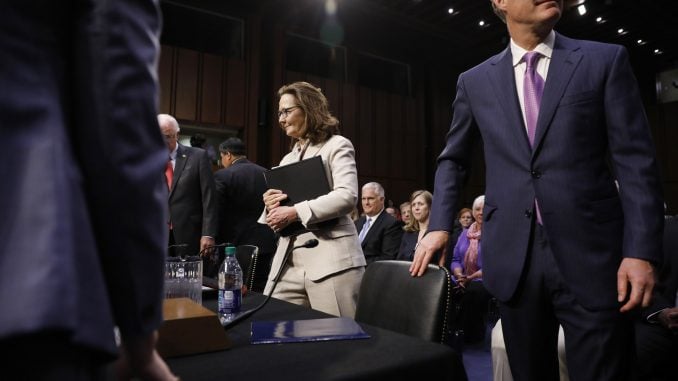
WASHINGTON, D.C.- President Donald Trump’s nominee to head the CIA promised lawmakers on Wednesday she would never resume a program of harsh interrogations, often denounced as torture, that has been the major issue complicating her confirmation.
Gina Haspel, currently the spy agency’s acting director, also told her Senate confirmation hearing she would not carry out any order from Trump that she found morally objectionable.
“My moral compass is strong. I would not allow CIA to undertake activity that I thought was immoral, even if was technically legal. I would absolutely not permit it,” Haspel told the Senate Intelligence Committee, chaired by Sen. Richard Burr (R-N.C.).
Haspel also faced questions during the hearing about her role in the use of harsh interrogation methods during former President George W. Bush’s administration, as well as the destruction of videotapes documenting the questioning.
“Having served in that tumultuous time, I can offer you my personal commitment, clearly and without reservation, that under my leadership, on my watch, CIA will not restart such a detention and interrogation program,” Haspel testified.
Haspel said U.S. law now clearly prohibits such interrogation methods, and “I fully support the detainee treatment required by law.”
Public questioning of Haspel on issues such as the effectiveness of the interrogations, CIA drone strikes and agency “renditions” of suspected militants to third countries may be limited because the operations remain classified.
“CIA has learned some tough lessons, especially when asked to tackle missions that fall outside our expertise,” Haspel said, explaining that in retrospect the agency was not prepared to conduct the detention and interrogation program employed after the Sept. 11, 2001, attacks on the United States by al Qaeda militants.
Haspel needs 51 votes to be confirmed as the first woman director of the CIA in the 100-seat Senate, where Trump’s fellow Republicans hold a 51-49 majority. The agency’s former deputy director, she would succeed Mike Pompeo, a Republican former congressman confirmed last month as secretary of state.
Haspel already has the strong support of many Republicans. As he opened the hearing, the panel’s Republican chairman, Richard Burr, praised Haspel.
“I believe your intellectual rigor, honorable service and outstanding judgment make you a natural fit to lead the CIA,” he said, urging that the hearing not be made “a trial about a long-shuttered program.”
But Haspel could face a difficult time being confirmed. At least one Republican, Senator Rand Paul, has said he opposes her, and others have said they will wait to see how she does at Wednesday’s hearing.
No Democrat has yet expressed support for Haspel.
‘MORALLY QUESTIONABLE BEHAVIOR’
Senator Mark Warner, the committee’s top Democrat, said his vote on Haspel’s confirmation will largely depend on how she expresses her current views on the harsh techniques and a 2005 decision to destroy tapes of interrogations.
“We must hear how you would react if the president asks you to carry out some morally questionable behavior that might seem to violate a law or treaty,” Warner said in his opening statement.
Warner also said he would want Haspel’s commitment to cooperate in investigations into Russia’s role in the 2016 U.S. election. Trump has called those investigations a “witch hunt.”
Before the hearing, a small group of protesters started shouting, “Say no to torture.” They were forcibly removed by the Capitol police.
Haspel described what she called the complex challenges her agency must confront, including terrorist groups, a nuclear threat against the continental United States by North Korea, “destabilizing Iranian adventurism,” China’s ambitions on the global stage and “an aggressive and sometimes brutal Russia.”
An undercover officer for most of her more than 30-year career, Haspel in 2002 served as CIAstation chief in Thailand, where the agency ran one of the secret prisons where suspected al Qaeda extremists were interrogated using procedures that included waterboarding, which simulates drowning.
A 2014 Senate Intelligence Committee investigation concluded that harsh intelligence methods during Bush’s presidency were “not an effective way of obtaining accurate information or gaining detainee cooperation.”



